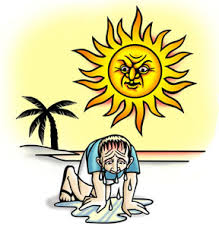As we are in the midst of summer and temperatures are rising, it is important to know how to stay out of danger in extreme heat. According to the CDC, more than 600 deaths occur every year due to heat. The elderly, outdoor workers, those with chronic medical diseases and the very young are more commonly likely to fall victim to heat related illnesses such as heat stoke and heat exhaustion. Since they are not necessarily able to meet their own needs, we need to help them.
Heat related illnesses can range from mild conditions (heat cramps, heat rash) to life threatening emergencies (heat stroke). Even short periods of heat exposure can cause heat related illness. These heat related illnesses occur when the body’s own cooling mechanisms are unable to regulate the body’s temperature. Also, loss of water and electrolyte through sweat causes the body’s temperature to rise rapidly. In humid conditions it is possible that the body is unable to produce enough sweat to cool the body down. Severely high body temperatures can cause damage to the brain and other vital bodily organs.
What are some signs/symptoms that a heat related illness is setting in?
-fatigue
-nausea
-muscle cramps
-extreme thirst
-dizziness
-headaches
-weakness
-confusion
-agitation
-fainting
-heart too slow or too rapid
It is very important to recognizing the symptoms and signs early. Waiting too long can allow the heat related illness to progress to more life threatening conditions. Steps should be taken immediately when they are recognized.
How can heat related illnesses be treated?
-first, victims should be moved out of the heat to a cooler environment.
-if necessary, call 9-1-1 to get emergency medical help.
-Try to get the victim to drink fluids. It is important to replace water as well as salt. But, don’t force them to drink if they are unable.
-The victim should be lain flat with their legs slightly raised.
-The victim can be wrapped in cool, damp towels or other clothing to more rapidly decrease their body temperature. Fans can also be used.
-ice packs can be placed in the groin, under the armpits or neck.
-If a thermometer is available, monitor the body temperature.
-it may be necessary to loosen or remove clothing.
If heat related illness or recognized and treated early, progression to more life threatening disease can be avoided. Typically, the victim should not be returned to the heat that same day. While these treatment measure can help, the best treatment is probably prevention. It is much better to prevent the onset of any heat related illness rather than trying to treat them after the fact.
How can heat related illnesses be prevented?
-if possible, stay indoors, preferably with air conditioning, during the hottest periods.
-drink plenty of fluids. Don’t wait until you are thirsty to start drinking. And make sure kids drink fluids.
-if you must be outdoors in the heat, try to limit activities to morning or evening hours.
-avoid drinks that contain alcohol, excessive amounts of sugar or caffeine. These types of beverages actually cause you to lose more water.
-cut down on your exercise in the heat.
-try to find shady areas to rest
-wear light weight, light-colored clothing that is loose-fitting
-never leave anyone in a closed, parked vehicle.
While summer time activities can bring fun, heat related illness can ruin this and in fact be life threatening or lead to permanent brain or organ damage. It is important to take the steps mentioned above to enjoy the summer, even when the temperatures soar.


